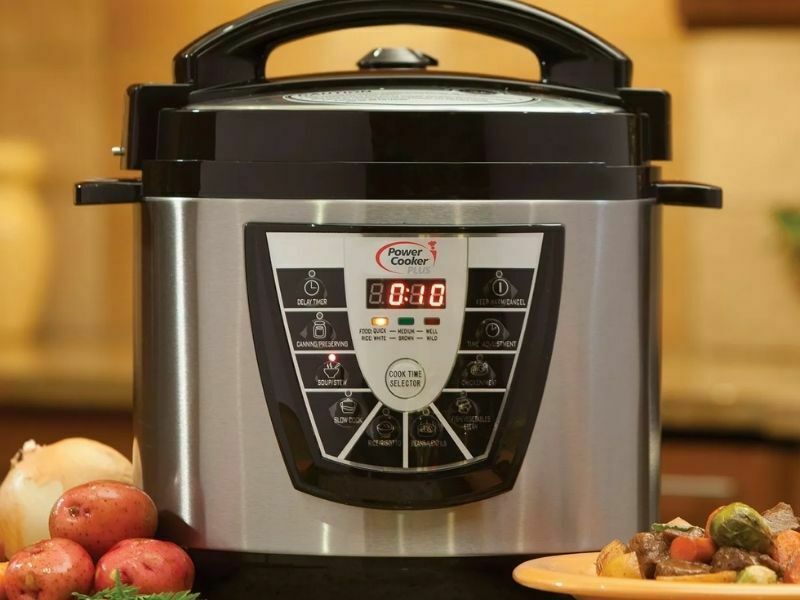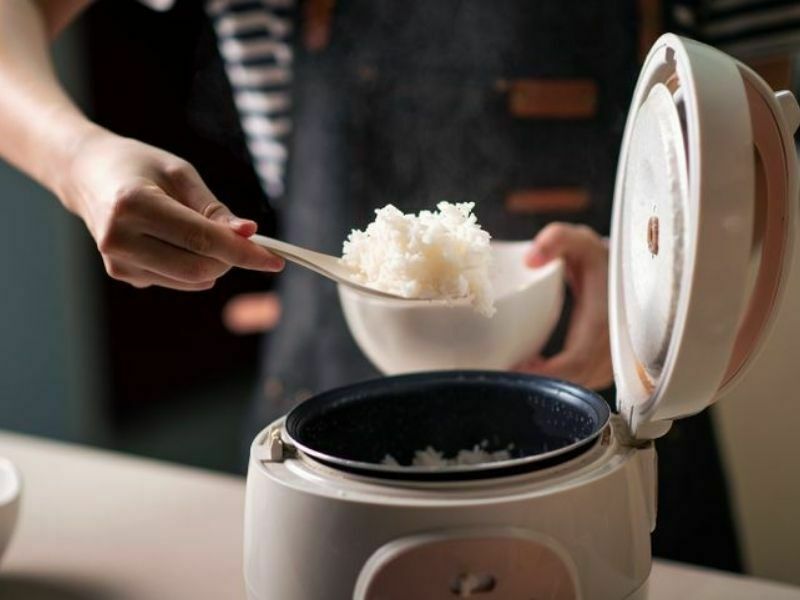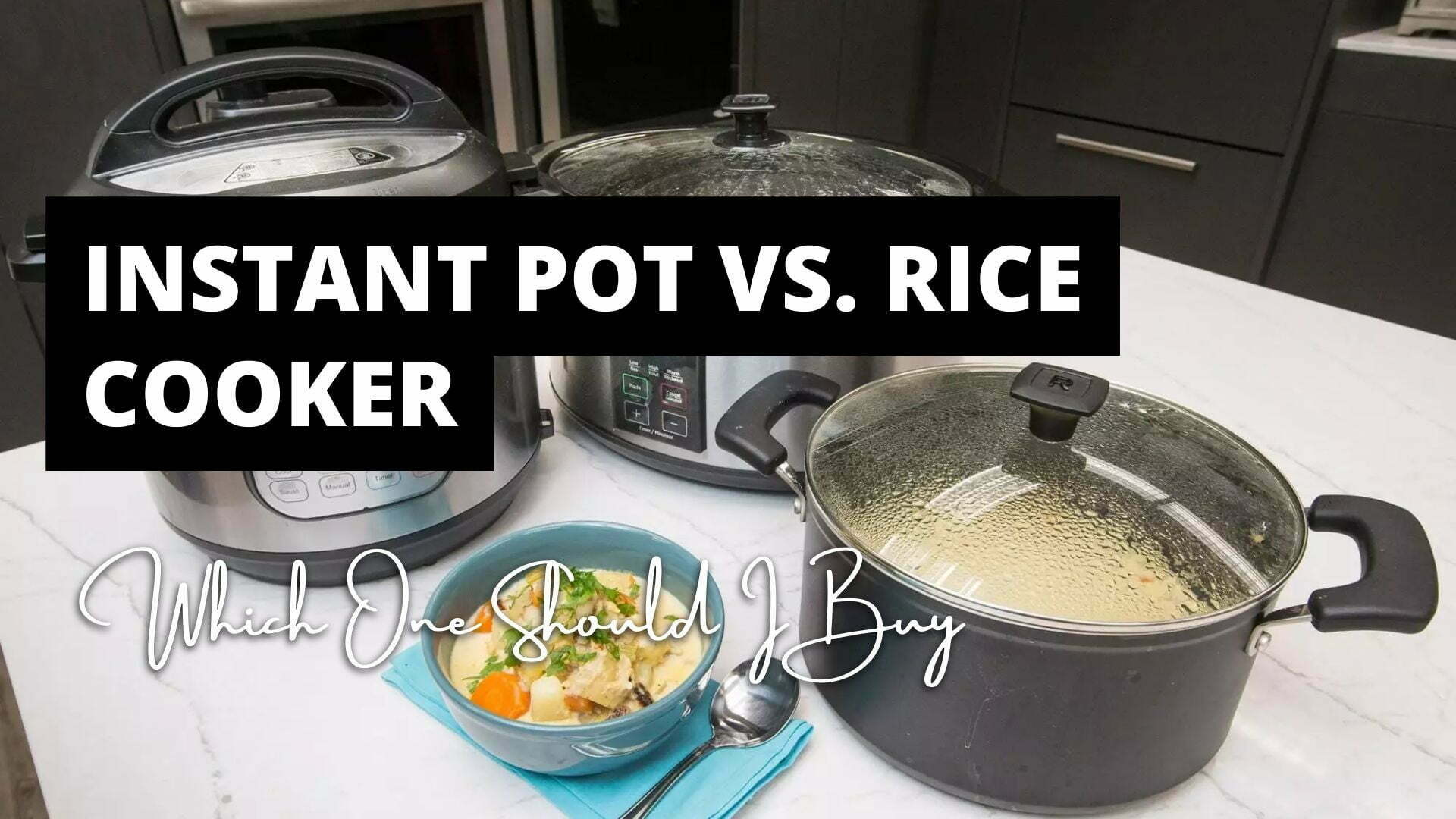Instant Pot vs. Rice Cooker: which will win? Both cook delicious rice, and both make it easy to do so. However, there are some key differences between the two – and the choice really depends on what you plan to use your rice cooker and instant pot for.
What Is An Instant Pot?
The Instant Pot is a small, smart, countertop appliance called a multicooker. It’s a programmable pressure cooker, slow cooker, rice cooker, yogurt maker, and more. Seven appliances in one: pressure cooker, slow cooker, rice/porridge cooker, sauté/browning, yogurt maker, steamer & warmer.
How Does It Work
The Instant Pot is a smart, programmable pressure cooker that makes cooking easier and faster.

The inner pot of the Instant Pot is made of stainless steel and sits on top of a trivet that holds it above a water bath. The pot has heating coils on the bottom and sides, but the sides heat up more slowly than the bottom does. This is because there’s less metal between the coil and the bottom of the pot than there is between the coil and the side, so heat dissipates more quickly.
For pressure cooking, a lid with a rubber gasket locks onto the rim of the pot. When you close it, air can’t escape from inside; when you cook, neither can steam. Because air can’t escape as liquid boils, pressure builds up inside until it’s roughly 15 times as much as normal atmospheric pressure. This has two effects: First, liquids boil at higher temperatures than they normally would. Second, food cooks faster because heat is transferred more efficiently through the water at higher temperatures. That’s why foods like beans or tough cuts of meat usually take only about half as long to cook in a pressure cooker as they do in an oven or slow cooker.
Pros of An Instant Pot
Instant pots can be used to cook anything from soups, stews, meats, and rice dishes. There are many different types of instant pots available with many features that make them the best kitchen appliance.
Here are some pros of having an instant pot:
1. It‘s fast
Instead of having to wait for the water to boil in a large pot on the stovetop and then simmer it for a while before finally starting to cook, your food cooks under pressure with the help of steam in a closed environment. Because there’s no exposure to air, most foods cooked in an Instant Pot will retain more of their nutrients.
2. It‘s versatile
Instant pots have a wider range of uses than rice cookers. Despite this, they’re nevertheless quite adaptable. Slow-cooking foods like soups and beans, as well as steaming vegetables and poaching fruits, may be done in modern models.
3. It’s easy to clean
The stainless steel inner liner of the instant pot makes it very easy to clean. There’s no scrubbing required, just use a damp cloth or paper towel with some soap and water.
4. It’s Save Energy
The Instant Pot uses about 70% less energy than traditional cooking methods. This makes it an eco-friendly appliance that can also help you lower your monthly energy bills!
Cons of An Instant Pot
1. Price
The cost is one of the main drawbacks for many consumers. While the Instant Pot does have several functions and can replace other appliances in your kitchen, it still costs a pretty penny.
2. Heavy
It’s a bit heavier, making it harder to move around than a standard cooker.
3. Take up a lot of space
If you have a small kitchen, it can be hard finding room for an Instant Pot. They’re pretty bulky and can be hard to store.
4. Hard to clean
Instant Pots have many different parts, and even though they’re dishwasher safe, there are still many parts that you must wash by hand. If you don’t like cleaning dishes, this might not be for you.
5. Dangerous
The pressure cooker function is what makes the Instant Pot so fast and versatile, but it also means it can be dangerous if not used correctly. You should always read the user manual before using any kind of pressure cooker.
What Is A Rice Cooker?
A rice cooker is an electronic kitchen appliance that automates the basic process of cooking rice. It typically consists of a heat source, a cooking bowl and a thermostat that controls the heat and switches it off once the rice has cooked. Many are designed as large pots for cooking on top of a stove.

Rice cookers automate the entire process of cooking rice, from measuring out the correct amount of water to steaming the rice after it’s cooked. The result is usually pretty good: perfectly fluffy, separated grains without any burnt starch on the bottom.
If you’re looking for an easy way to prepare a staple food in your home, there are many great options out there on the market.
The best rice cooker will cook your rice to the perfect texture without boiling over or scorching.
How Does It Work?
The most basic function of a rice cooker is to automatically turn off when the rice is done cooking. This is done with a thermal sensor inside the pot, which detects when all the water has been absorbed by the rice. At this point, it switches off the heating element and goes into “keep warm” mode.
The two basic types of rice cookers are on/off and fuzzy logic. The on/off type has only two functions: cook and keep warm. Fuzzy logic machines, on the other hand, use complex algorithms to monitor temperature and adjust cook times accordingly. They can also be used for other functions, such as steaming or slow cooking.
Pros of A Rice Cooker
1. It’s easy to use
Many people have trouble cooking perfect rice on the stovetop, because it requires attention to detail and timing. It’s easy to let it boil over or cook unevenly. With a rice cooker, you just measure the rice and water, push a button and walk away.
2. It’s convenient
You can set up your rice cooker in the morning before work and come home at night to a hot meal that’s ready to eat when you are. There’s no need to rush home to watch the pot so it doesn’t burn or overcook.
3. Saves Time
One of the biggest advantages of using a rice cooker is the fact that you can save a lot of time with it. You can simply put all ingredients into the pot, set the timer and wait until everything gets ready on its own. This way you will have more time for other things in your busy life and you won’t need to worry about burnt or undercooked rice anymore. With this device, you can have perfectly cooked rice every time without any hassle or fuss.
4. It produces perfect results every time
Rice cookers are calibrated by their manufacturers to get the best possible results with each batch of rice, so you know what you’re getting every time you press that button.
5. Variety
Aside from cooking rice, other dishes like porridge, soups, stews and steamed foods are also possible with a rice cooker.
6. Flavor enhancement
The sealing lid traps steam inside of the cooker, which helps to lock in flavor and enhance the taste of the rice. It is also ideal for steaming vegetables or fish at the same time as your rice cooks.
7. Easy cleanup
The inner cooking bowl of a rice cooker is usually nonstick, which makes cleanup quick and easy. Many bowls are also detachable, so they can be washed in the dishwasher or by hand.
Cons of A Rice Cooker?
1. Not a multi-purpose appliance
While it can be used to cook other items besides rice, such as soups and stews, many people feel that a rice cooker is too specialized for their needs. If you prefer an appliance that does more than one job, then a rice cooker may not be for you.
2. Expensive
You have to weigh the costs of buying one against how much money you would save in terms of your time and energy. This is a personal decision.
3. It takes up space in your kitchen
If you don’t have much counter space or cupboard space for storage, then it may not be practical for you to buy a rice cooker.
4. Slow cooking
If you need to cook rice quickly, a rice cooker is not your best option. While it will cook rice in a reasonable time frame, there are other options available which will do it faster. If you only have a couple of minutes and need to get dinner on the table then a microwave or saucepan may be better suited to your needs.
5. Cooking small amounts of food
Rice cookers are designed to take care of large quantities of food. If you just need to prepare food for one person, then it can be overkill. In this case it’s better to use something smaller such as a microwave or stove top pan.
6. Not all models have an automatic shut off
Some models will automatically turn the machine off when the food has finished cooking but others don’t include this feature. It’s important to check the manual before using any model as otherwise you could end up with burned or undercooked food!
Instant Pots vs Rice Cookers: What’s the Difference?
If you’re a fan of rice, you might have wondered about the difference between a rice cooker and an Instant Pot. Both make it incredibly easy for you to make a variety of dishes, but they do it in different ways. So which one is better?
1. Convenience
The Instant Pot has a significantly higher number of functions and it also has many pre-programmed functions, so that once you have the necessary ingredients in it, you can just select the type of food you’re cooking, press start, and the Instant pot will take care of the rest.
The rice cooker is an example of a modern convenience that has made cooking rice easier. Most rice cookers are designed with a large bowl (known as the cooking pan or inner pot), a small control panel, and a heating element.
2.Versatility
Rice cookers aren’t as versatile as instant pots. However, they’re still very versatile. Modern ones can be used for slow cooking stuff like soups and beans, steaming veggies, and poaching fruits.
The Instant Pot has 6-in-1 versatility—it can act as a pressure cooker, slow cooker, rice cooker, warmer, and steamer. Depending on the model you get, it may also come with a yogurt maker function.
Rice Cooker: A basic rice cooker will cook your rice for you and keep it warm until you’re ready to serve it. Some models also have a “steam mode” that allows you to steam meat or vegetables while cooking the rice.
3. Pressure Cooking
Both devices can pressure cook, which means that they can cook food quickly in a sealed environment.
The Instant Pot is a pressure cooker by design, and one of its most versatile functions is the ability to create quick, healthy meals with minimal effort.
A rice cooker is not technically a pressure cooker, but some models have this function built in. In fact, some brands — such as Zojirushi — even have specific “pressure cook” models for their rice cookers.
4. Appliance
Rice cookers are dedicated appliances that do only one thing: cook rice. They make it easy to get perfectly cooked rice with no guesswork or hard work involved.
Instant Pots are multi-use, programmable electric pressure cookers. They have many functions, including pressure cooking, slow cooking, sautéing, warming and steaming (some models even have a built-in yogurt maker). Some Instant Pots include a “rice” preset button that simplifies the process of cooking good rice in the device.
5. Capacity and Size
The Instant Pot’s maximum capacity is 8 quarts, whereas the rice cookers is 10 cups.
FAQs
1. Is an Instant Pot a rice cooker?
An Instant Pot is not a rice cooker. It can cook rice, but it has a lot of extra features that allow you to make other dishes in the same device.
2. Are pressure cookers better than slow cookers?
Pressure cookers are better at cooking food fast, while slow cookers are better at cooking food slowly.
3. Can I use an Instant Pot as a slow cooker?
You can use your Instant Pot as a slow cooker. Using the “slow cook” setting on your Instant Pot will allow you to put it on low or high for up to 10 hours as long as the lid is sealed and locked into place.
4. Does instant pot cook rice?
Yes, an Instant Pot can cook rice, but it won’t necessarily do it better than a rice cooker. If you’re looking for the perfect fluffy white rice or Spanish rice, you’re better off using a dedicated rice cooker.
5. Can I cook brown rice in a rice cooker?
Brown rice takes 1-1/2 to 2 times as long as white rice to cook, so you would need to increase the water and cooking time for brown rice.
6. Can you cook dry pasta in a rice cooker?
Yes, you can cook pasta in a rice cooker. The key is to have enough water, with an additional equal amount of water for evaporation.
7. Do you have to stir pasta while it’s cooking?
No, but you do need to check it regularly to make sure that it isn’t sticking together or sticking to the bottom of the pan.
8. Can I leave my rice cooker on all day?
Yes, you can definitely leave your rice cooker on all day if you’re busy with other stuff and won’t have time to check on it. It will keep your food warm until you come back to it. Also, it is good for cooking soups or stews since they need more time to boil and cook thoroughly.
Conclusion
The Instant Pot vs rice cooker debate is a close one. However, if we had to choose, the Instant Pot would win for us. In the end, both rice cookers and the instant pot have their advantages and disadvantages in terms of capability and ease of use. We hope that after reading our comparison you can make an informed decision. Simply put, choose the device that fits your lifestyle best!

